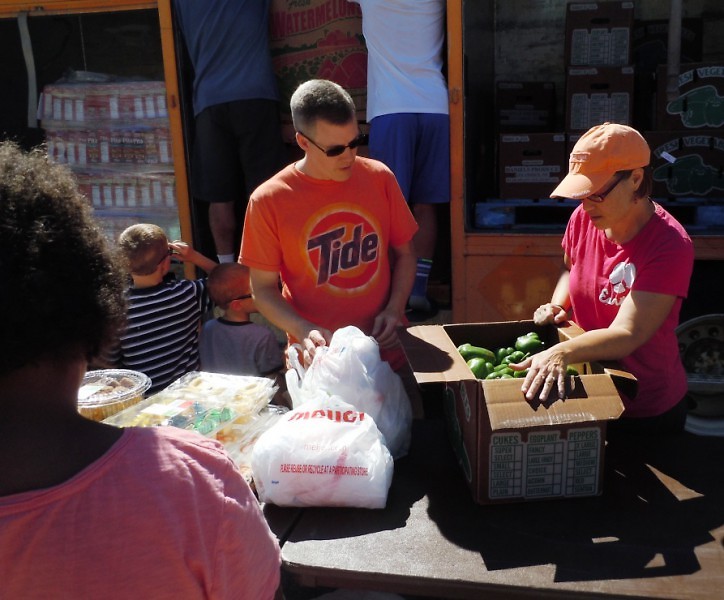There’s a place where hunger haunts the lives of 80,000 people, where employment can’t guarantee a life over the poverty line and where one in five kids is growing up unsure of where their next meal will come from.
That place is Kent County, Michigan.
This September, Kent County will stand up and declare that food insecurity is unacceptable in West Michigan.
Hunger Action Week 2013, coordinated by representatives from nearly a dozen local hunger-relief organizations, is a series of events designed to increase awareness of food insecurity, to promote empathy with those in need and to provide practical next steps. Hunger Action Week runs from September 8 -14.
Christine Lentine, outreach director at Kids’ Food Basket and Hunger Action Week committee chair, calls this year’s lineup of events “phenomenal.”
“The support we’ve gotten from local chefs, bloggers and businesses has been amazing,” Lentine said. “It is moving that our community cares so deeply for our fellow citizens and is willing to help. It's our third year and best yet!”
Highlights from this year’s campaign include the Paper Plate Project, a visual display of personal stories of hunger curated by Access of West Michigan’s Food Pantry Network; the Healthy Food Cook-Off at United Church Outreach Ministry, which pits local chefs against each other in a contest to create the most delectable healthy meal from food pantry fare; and three showings of “A Place at the Table,” a documentary on hunger in America.
This year’s campaign also includes a Hunger Challenge in which participants live on a SNAP (food stamp) recipient’s average weekly allotment — $31.50.
“This isn’t a contest to see who can live the most frugally,” said Feeding America West Michigan Food Bank’s Elianna Bootzin. “It’s an opportunity to get a personal understanding of what circumstances lead to the daily sacrifices food-insecure people have to make, choosing between quality and quantity, for example.”
The week’s other events lend important context to the Hunger Challenge, Bootzin said. “Food insecurity doesn’t exist in a vacuum. Often it’s compounded by a number of other stressors — medical bills, living expenses, tuition, a car breaking down.
“We want people to come away from this week understanding how hunger fits into the larger context of poverty,” she said.
Information about Hunger Action Week events can be found on the campaign’s Facebook and Twitter pages.
Hunger Action Week is organized by members of Kent County’s Food and Nutrition Coalition: Access of West Michigan, Feeding America West Michigan Food Bank, Grand Valley State University Women’s Center, Heart of West Michigan United Way, Heartside Nutrition Project, Kids’ Food Basket, Salvation Army Booth Family Services, United Church Outreach Ministry and the YMCA of Greater Grand Rapids.
The Rapidian, a program of the 501(c)3 nonprofit Community Media Center, relies on the community’s support to help cover the cost of training reporters and publishing content.
We need your help.
If each of our readers and content creators who values this community platform help support its creation and maintenance, The Rapidian can continue to educate and facilitate a conversation around issues for years to come.
Please support The Rapidian and make a contribution today.


Comments
It would be great if we could implement some longer term strategies toward solving the problem of hunger in West Michigan.
Rachel, thank you for your perceptive critiques and for advancing the discussion. Feeding America West Michigan, for whom I'm blessed to work, is a proud partner of Kids' Food Basket, an agency that does amazing work staving off hunger for thousands of West Michigan kids.
You're exactly right that people don't just need calories, they need nutritious food. Feeding America West Michigan has been pushing hard in the direction of fresh, perishable, and often local fruits, vegetables, and dairy through our Mobile Pantry Program, whose deliveries account for about one third of the food we distribute.
While our goal is for everyone we serve to ultimately stand on their own feet, we believe that providing a strong line of defense against hunger is imperative. We're firm believers in the teach-a-man-to-fish model, and many of our agencies do just that, but we also recognize that a man can't think about tomorrow's meals if he's going hungry today.
Thanks for your comment. I definitely believe hunger is a complex problem, nationwide, and I would never say that the solution, metaphor-wise, would be to give everyone a fishing pole and yell, "Scram!" Poor nutrition is a problem in every socio-economic demographic. I would go as far as to say that the average American who simply goes along with our current food culture, with all the messages sent from advertising, all the social pressures, the design of grocery stores, the deliberately designed to be addictive foods, etc., will wind up being both overweight and malnourished and uncertain of how it happened. We are set up to fail, and most of us don't understand nutrition and have little contact with genuinely nourishing foods. I'm not saying that as some sort of elitist foodie, either. I've been retraining myself in making, eating, and serving food to myself and my family for half a decade now, and I'm definitely still learning.
I know there's a balancing act between making sure people have the food they need to survive and giving them the skills and food access to feed themselves well. I'd like to hear which longer term solutions are part of the discussion now.